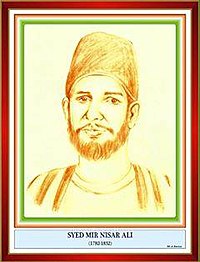Titumir | |
|---|---|
 A portrait of Titumir | |
| Born | Syed Mir Nisar Ali 27 January 1782 |
| Died | 19 November 1831 (aged 49) Narikelbaria, Bengal, British India |
| Movement | Tariqah-i-Muhammadiya[1] Indian independence movement |
| Parents |
|
| Islam in Bangladesh |
|---|
 |
Syed Mir Nisar Ali (27 January 1782 – 19 November 1831), better known as Titumir, was a Bengali revolutionary in British India, who developed a strand of Muslim nationalism coupled with agrarian and political consciousness. He is famed for having built a large bamboo fort to resist the British, which passed onto Bengali folk legend.[2][3][4]
Titumir was ranked number 11 in the BBC's poll of the Greatest Bengali of all time.[5]
- ^ Sirajul Islam; Miah, Sajahan; Khanam, Mahfuza; Ahmed, Sabbir, eds. (2012). "Tariqah-i-Muhammadiya". Banglapedia: the National Encyclopedia of Bangladesh (Online ed.). Dhaka, Bangladesh: Banglapedia Trust, Asiatic Society of Bangladesh. ISBN 984-32-0576-6. OCLC 52727562. OL 30677644M. Retrieved 19 November 2024.
- ^ Cite error: The named reference
:0was invoked but never defined (see the help page). - ^ Dasgupta, Atis (1983). "Titu Meer's Rebellion: A Profile". Social Scientist. 11 (10): 39–48. doi:10.2307/3517042. ISSN 0970-0293. JSTOR 3517042.
- ^ Sarkar, Sumit (1985). "Social History: Predicaments and Possibilities". Economic and Political Weekly. 20 (25/26): 1083. ISSN 0012-9976. JSTOR 4374537.
- ^ —"Listeners name 'greatest Bengali'". BBC. 14 April 2004. Retrieved 16 April 2018.
—Habib, Haroon (17 April 2004). "International : Mujib, Tagore, Bose among 'greatest Bengalis of all time'". The Hindu.
—"Bangabandhu judged greatest Bangali of all time". The Daily Star. 16 April 2004.